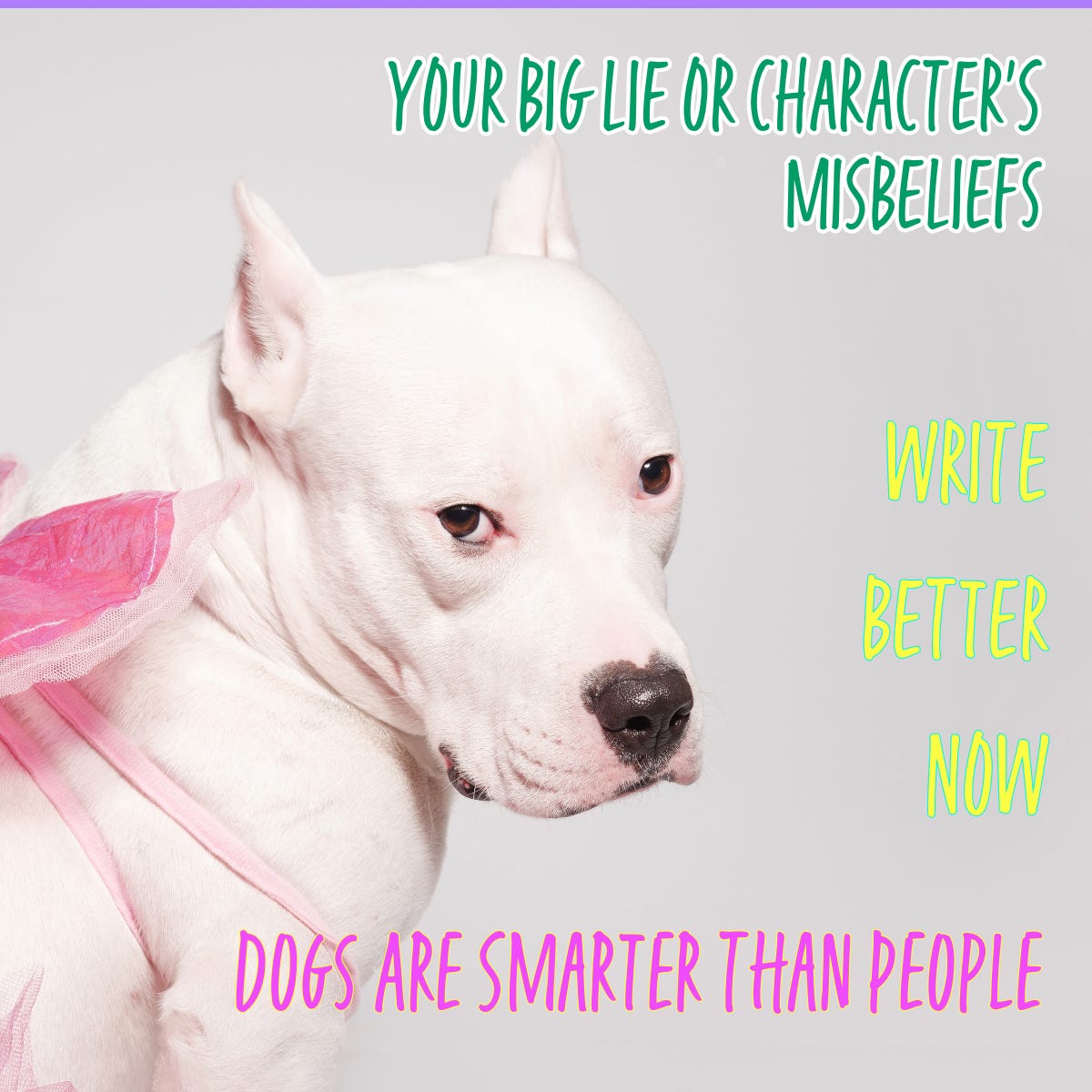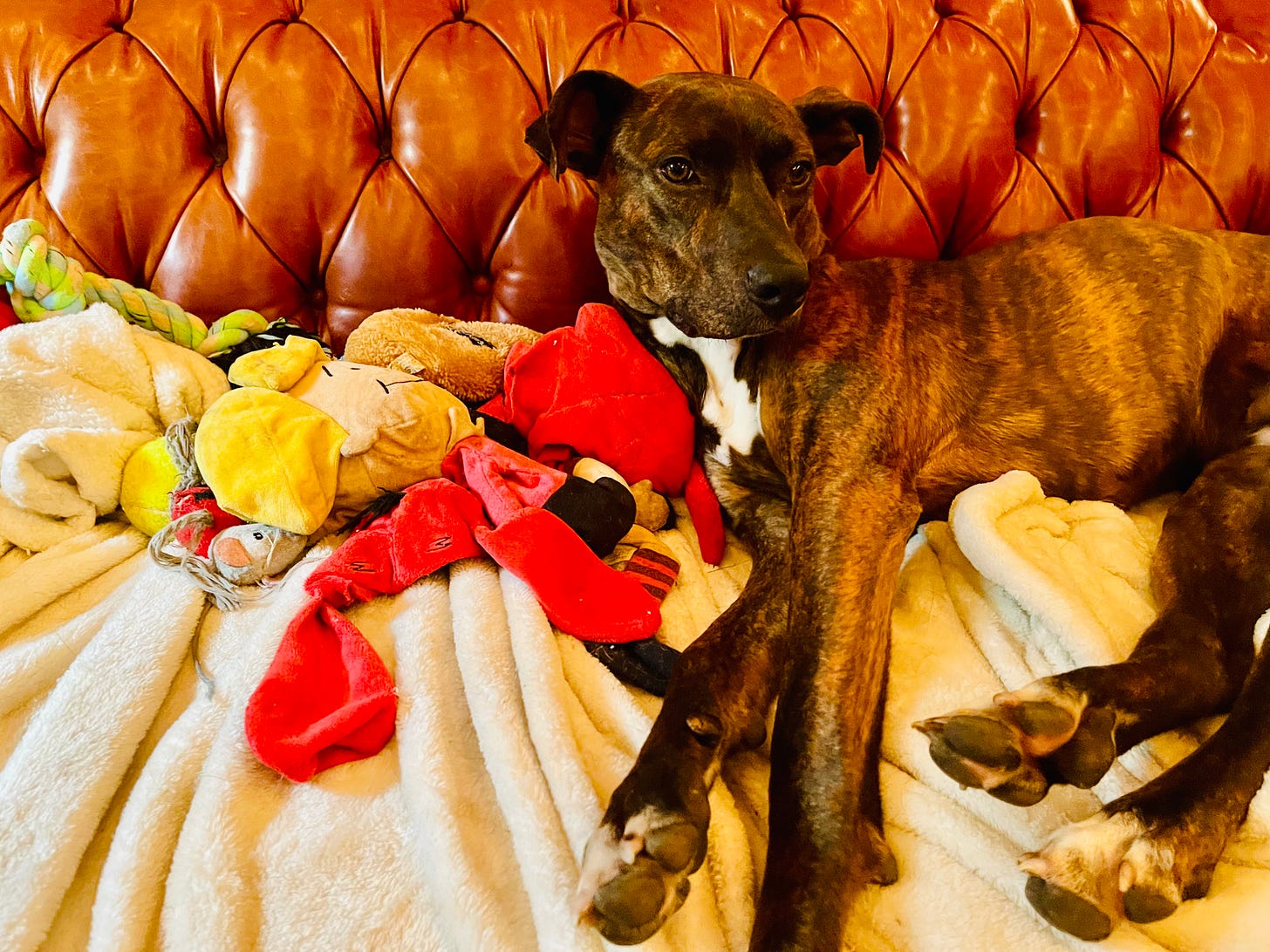YOUR BIG LIE OR CHARACTER’S MISBELIEF
Write Better Now and Dogs Are Smarter Than People
We’re doing a hybrid writing tip and podcast this week.
All the important stuff is written down here. All the fun stuff and Shaun aka The Talent is in the podcast where we talk about this important writing stuff and other things.
So, let’s get started.
The big lie or the character’s misbelief in your story is a major key to your character’s story arc, which is basically the emotional change and development of who you character is.
The lie drives the stupid or wonderful things that they do in the story.
It’s what motivates them in a way.
Sometimes the protagonist or main character or hero of your story doesn’t believe THE BIG LIE, but everyone else does. That’s super cool, too.
The lie can be a small deal—I am going to win the Little Miss New Hampshire Song and Dance Contest though I can’t move my hips and I am ancient and the contest is for 8 year olds and under. (I now want to write this story)
The lie can be a big deal on a societal and personal level—Might always makes right, so I’ll beat everyone up to get my way.
On Writers Helping Writers they say that the big thing is this: Your lie has to move the plot forward and it has to relate to your story’s theme.
They also break it down to inner and outer lies (which are a bit like character-driven lie and plot-driven lie, right?).
They write:
“Plot-driven stories often focus primarily on an outer-world Lie such as Hunger Games‘ Lie that “oppressive government is necessary” or Jurassic Park‘s Lie that “science should always be advanced.” Character-driven stories usually focus on an inner Lie, such as “men and women can’t be friends” in When Harry Met Sally or “money is the measure of worth” in A Christmas Carol.
“An inner-world Lie will affect the character’s outer world, sometimes even to the point of becoming the outer world’s Lie. And vice versa, an outer-world Lie will likely become crucial to the character’s inner conflict and self-estimation.
“The distinction is important not so much because of how the Lie manifests in the story as it is because of where the Lie originated. Where did this Lie come from? Who (or what) gave this Lie to the character? And what do the answers mean for the character’s motivations and ultimate arc within this story?”
Carrie is going to be talking more about this in the upcoming weeks, but we want for you to think about those questions for your own life too.
Is there something you believe that might not be quite right? Sometimes it might be that you’re bad at art or sports or school. Sometimes it might be that you can only be loved if you are perfect. Sometimes it might be that if you just work hard enough you can be Bill Gates rich.
Just like for your characters, your lie can be destructive to your own life.
On Writers Helping Writers, Angela Ackerman writes,
“We are often our own biggest critics, aren’t we? Whenever something goes wrong, we feel disappointed, frustrated, upset, or hurt. The fallout might cause others around us to suffer too, causing further anguish and guilt. When this happens, unless the situation was in no way tied to us, we tend to blame ourselves:
“When the character’s thoughts circle disempowering beliefs (that they are incompetent, naïve, defective, or they lack value) as a reason for their failure, it eats away at their self-worth. This, combined with a need to identify the pain’s cause will lead to a specific effect: an internal lie will form. This Lie (also called a False Belief or Misbelief) is a conclusion reached through flawed logic. Caught in a vulnerable state, the character tries to understand or rationalize his painful experience, only to falsely conclude that fault somehow lies within.”
DOG TIP FOR LIFE
Pogie’s big lie is that she’s a super toughie. She is not. Do you have this lie?
WRITING TIP OF THE POD
Think about your character’s lie. What is it that they wrongly believe?
LINKS WE TALK ABOUT
https://www.helpingwritersbecomeauthors.com/2-different-types-of-lie-your-character-believes/
https://writershelpingwriters.net/2018/04/the-destructive-power-of-the-lie-your-character-believes/
SHOUT OUT!
The music we’ve clipped and shortened in this podcast is awesome and is made available through the Creative Commons License.
Here’s a link to that and the artist’s website. Who is this artist and what is this song? It’s “Summer Spliff” by Broke For Free.





